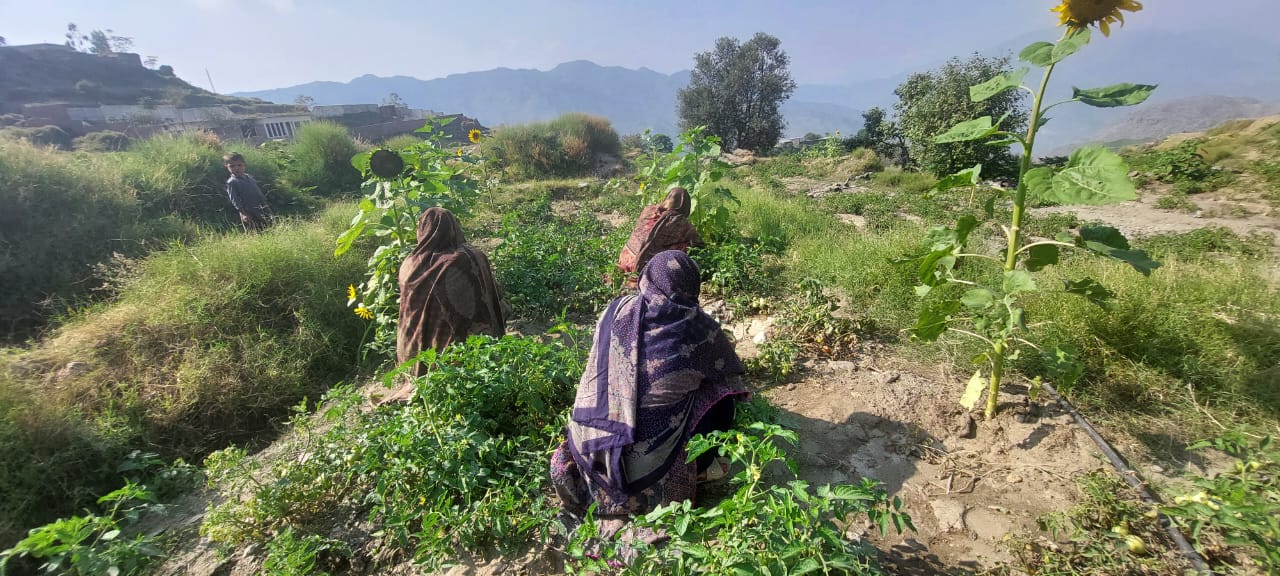
From Middleman to Market Leader: Hajath's Empowering Journey

Hajath Meena, a 40-year-old mother of five, spent most of her life tending the land in the rugged Khyber, a district in Khyber Pakhtunkhwa (KP) along the historic Khyber Pass. Known for its challenging terrain and resilient people, Khyber district had shaped Hajath into a hardworking woman, dedicated to her family's farming business. For 15 long years, she grew vegetables on her small plot of land, selling them through middlemen at the district market. Yet despite working tirelessly for over ten hours each day, something always felt amiss. Her hard work was not yielding the rewards she hoped for, and the dream of turning her efforts into a profitable business seemed distant.
"I often wondered if there was more to this than just hard work," Hajath confided. "I needed to find a way to make my efforts truly count." Though deeply passionate about farming, Hajath did not have the knowledge or skills to unlock the full potential of her produce. She knew her vegetables had value, but middlemen paid her barely enough to get by. Still, she pressed on, holding onto the hope that one day, she could break free from this cycle and build something bigger.
That opportunity came when Hajath was selected to attend a training session on entrepreneurship and agri-marketing. This initiative was part of the Livelihood Support to Women Farmers (LFSA) project, a joint effort between UN Women and the FAO, funded by USAID. As a respected leader in her community's Field Farmer School, Hajath was chosen to be one of 30 women from the region to learn new skills aimed at improving their livelihoods. The training focused on post-harvest value addition in vegetables, including essential skills like grading, packing, marketing, and business management-skills Hajath had never imagined she could master.
"I always knew my vegetables were worth more than what I was being paid," she said. "But I did not have the knowledge or confidence to demand a fair price. This training was a game-changer for me."At first, Hajath felt unsure. She had never attended formal training before and feared that the concepts would be too complex for her to understand. But the trainers used simple, engaging methods-visual aids, case studies, and role-playing exercises-that made the lessons accessible and enjoyable. Slowly but surely, her doubts began to fade, and she absorbed the skills that would transform her approach to business.
One of the most valuable lessons for Hajath was how to price and market her produce effectively. "After the training, I understood my French beans' true value," she explained with a smile. "Instead of selling them to middlemen for PKR 150 per kg, I now sell directly to customers for PKR 400 per kg. That's a 35% increase in profits for just one transaction!"
This success was a turning point for Hajath. The confidence she gained through the training filled her with a renewed sense of purpose, and just a week later, she attended another workshop-this time, hosted by the State Bank of Pakistan. There, she learned about microcredit opportunities for women entrepreneurs. Inspired by what she had learned, Hajath now plans to take out a loan from First Women Bank Limited to start a small dairy farming business on the side. Her dream had evolved: no longer was she simply trying to make ends meet. She envisioned creating multiple streams of income to secure her family's future and, perhaps more importantly, to become a role model for other women in her community.
Throughout this journey, Hajath's husband had been a steadfast supporter. Even now, her eldest son helps her with the marketing of her vegetables, a testament to how the whole family has become involved in her entrepreneurial journey.
Today, Hajath not only feels empowered but is also passing on her newfound knowledge to her younger sister. She encourages her sister to pursue her own dreams, believing that every woman should have the opportunity to succeed. "One day," Hajath says, "I hope that women like me will no longer be just unpaid laborers on family farms. I want to see women become true entrepreneurs, leading their families and communities toward a brighter, more prosperous future."